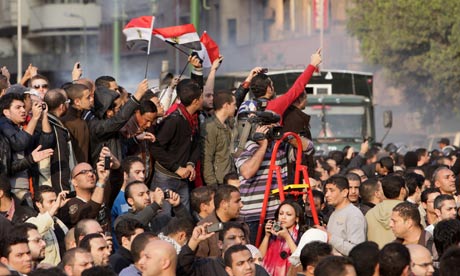
I’ve been following the news of major political mobilization from the Tunisia, Egypt, Yemen and Lebanon, and now I see in Jordan too, with great interest. Since I was an eyewitness to the changes in East Central Europe, participated a bit and thought and wrote about them during and after, I can’t help but think about comparisons and contrasts. I think Roger Cohen’s piece drawing the comparison substitutes hope and dreams for careful analysis and is overly optimistic. Rather for me the comparison leads to questions and concerns.
I wonder why the roundtables that were key to the transition in Central Europe, but also in South Africa and Latin America, and earlier in Spain, which provided a kind of special architecture for the transition from dictatorship to democracy, are not being discussed in Tunisia.
I wonder to what extent there exists in any of the countries the kind of social custom of pluralistic self organization which provided the micro infrastructure for the successful peaceful transition to democracy in Poland, what I call the politics of small things.
And tonight as I watch the dramatic video reports on television of the intensified protests in Cairo, with escalating violence, I worry not only about the frightening likelihood that by the time I wake up tomorrow, there may be massacres in the street ordered by the dictator in a last ditch attempt to stay in power. I also worry what will happen when he is finally overthrown, and the protestors have their day.
I have no expertise in Egypt and its neighbors beyond what I read in the newspapers and in casual reading of magazine and journal articles. I tend to think that the fear of the Muslim Brotherhood that the regime propagated has been self serving. I don’t know how the Brotherhood will act or whether it will act only in one direction. I worry about sectarian violence, about how changes in Egypt will affect other countries of the region and beyond. I suspect that the measured and cautious approach of President Obama, supporting democratic rights without daring to say the “D – Word,” as Mark LeVine put it on the Aljazeera website, was motivated by such concerns. Tonight Obama appeared overly cautious, but tomorrow his approach likely will change, and, in fact, he does underscore democratic ideals in his statement.
But this is not my major concern. My concern is smaller in a sense. I want to know what people are saying to each other on the streets of Tunis, Cairo, Beirut, Amman and Sanaa. I know that they are saying “no” to the old regime, but worry that they haven’t developed a capacity to discuss among themselves what they favor, and haven’t developed the means to discuss among themselves alternative principles and compromises. I examined this issue in a chapter of my book The Politics of Small Things, in which I demonstrate that because the Romanians could only say no, their post communist experience was particularly a tough one. Because the experience of talking together beyond saying no was more limited in Czechoslovakia than in Poland, Poland had an easier democratic transition. A democratic aftermath to dictatorship goes beyond the power of no.
Next on DC: Commentary on the situation in Egypt from an expert.
Good point about people not knowing what to do after saying ‘No.’ There appears to be some hope that skilled and educated expats will return to Tunisia and help build capacity. In Egypt, another expat ElBaradei is billed (by many) as the one to lead a post-Mubarak government. This is different than in Iran in 2009 when there was a reform movement with a leader and a plan inside the country. Unfortunately, Ahmadinejad was able to organize counter-protests and suppress the reformers, something neither Ben Ali or Mubarak were capable of. So while there is overwhelming opposition to Ben Ali and Mubarak, it does seem that there’s not really a plan beyond saying ‘No.’ Let’s hope an inclusive one emerges.
I read an interesting report in my daily paper TAZ today by their correspondent in Kairo, Karim El Gawhary. He says that one of the most striking aspects of what is happening at the moment is that people, strangers, when they meet, share their stories of experiences of repression and poverty, but also their hopes. Often, they end up holding each other in their arms after listening to each other. El Gawhary calls it a “moment of public therapy”. Seems like the process of learning what to say after “No” has started, even though it promises to be long one.
[…] reflections in recent years, concerning the transformation of Central Europe, and also concerning the attempted transformations in the Middle East and North Africa, and to politics of Occupy Wall Street. The proposition also informs my review and analysis here of […]